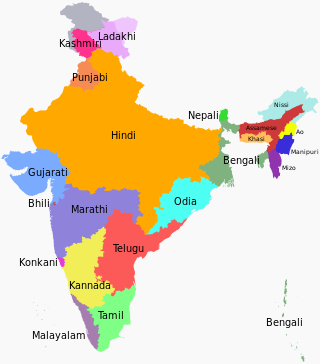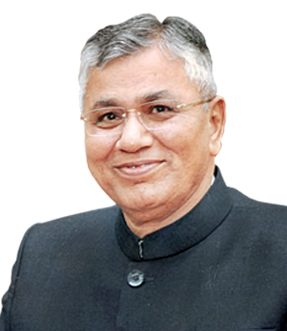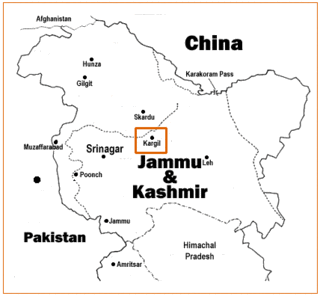Related Research Articles

The Padma Vibhushan is the second-highest civilian award of the Republic of India, after the Bharat Ratna. Instituted on 2 January 1954, the award is given for "exceptional and distinguished service". All persons without distinction of race, occupation, position or sex are eligible for these awards. However, government servants including those working with PSUs, except doctors and scientists, are not eligible for these Awards. As of 2024, the award has been bestowed on 336 individuals, including thirty-one posthumous and twenty-one non-citizen recipients.
The Padma Bhushan is the third-highest civilian award in the Republic of India, preceded by the Bharat Ratna and the Padma Vibhushan and followed by the Padma Shri. Instituted on 2 January 1954, the award is given for "distinguished service of a high order...without distinction of race, occupation, position or sex." The award criteria include "service in any field including service rendered by Government servants" including doctors and scientists, but exclude those working with the public sector undertakings. As of 2020, the award has been bestowed on 1270 individuals, including twenty-four posthumous and ninety-seven non-citizen recipients.

There is no national language in the Republic of India. However, article 343(1) of the Indian constitution specifically mentions that "The official language of the Union shall be Hindi in Devanagari script. The form of numerals to be used for the official purposes of the Union shall be the international form of Indian numerals," while article 343(2) allowed for the continuation of English as an official language for another 15 years and 343(3) gave the parliament the power to provide for the use of English language after this period. The clause 3 of the Official Languages Act, 1963 allows for the continued use of English language for official purposes of the Union government and for parliamentary business. Hence Indian English and Modern Standard Hindi are the Official Languages of the Government of India.

The Indian Police Service is a civil service under the All India Services. It replaced the Indian Imperial Police in 1948, a year after India became independent from the British Empire.
India maintains 10 paramilitary forces.

Adhir Ranjan Chowdhury is an Indian politician serving as the leader of the Indian National Congress in the 17th Lok Sabha since 2021 and from 2019 to 2021 and the Member of Parliament from Berhampore since 1999. He is also the current president of West Bengal Pradesh Congress Committee following the demise of Somendra Nath Mitra since 2020 and from 2014 to 2018, Chairperson of Public Accounts Committee (India) since 2019, Minister of State of Railways from 2012 to 2014 and the member of the West Bengal Legislative Assembly from 1996 to 1999.

The Ministry of External Affairs of India is the government agency responsible for implementing Indian foreign policy. The Ministry of External Affairs is headed by the Minister of External Affairs, a Cabinet Minister. The Foreign Secretary, an Indian Foreign Service officer, is the most senior civil servant who is the head of the Department of Foreign Affairs. The Ministry represents the Government of India through embassies and is also responsible for India's representation at the United Nations and other international organizations and expanding and safeguarding India's influence and Indian interests across the world by providing developmental aid to other countries worth billions of dollars. It also advises other Ministries and State Governments on foreign governments and institutions.

Naresh Chandra was a 1956 batch IAS officer of Rajasthan cadre who served as the Cabinet Secretary of India, Defence Secretary of India, Home Secretary of India, Water Resources Secretary of India and Indian Ambassador to the United States. He was awarded India's second highest civilian honour the Padma Vibhushan for civil service in 2007.

The Cabinet Secretary is the top-most executive official and senior-most civil servant of the Government of India. The Cabinet Secretary is the ex-officio head of the Civil Services Board, the Cabinet Secretariat, the Indian Administrative Service (IAS), and all Civil Services of India work under the rules of business of the government.

In India, the Central Armed Police Forces (CAPF) is the collective name of central police organisations under the Ministry of Home Affairs of India. These are technically paramilitary forces formerly known as the Central Para-Military Forces. Since 2011, India adopted the term "central armed police forces" to drop the word "paramilitary". These forces are responsible for internal security and guarding the borders. These forces are indeed headed by a Director General (DG), who is usually an Indian Police Service (IPS) officer, except for Assam Rifles, which is headed by an Lt. General-ranked officer from the Indian Army.

MediaOne TV is an Indian Malayalam-language television channel operated by Madhyamam Broadcasting Limited. The channel was licensed in September 2011 and was officially launched on 10 February 2013. The main studio is located at Velliparamba, Kozhikode, Kerala.
Nido Tania was a 20-year old student from Arunachal Pradesh who was murdered in the Lajpat Nagar area of Delhi, triggering widespread protests. Tania was the son of Arunachal Pradesh Congress legislator Nido Pavitra. At the time of his death, he was studying at Lovely Professional University, Jalandhar. He was beaten by shopkeepers for resisting.
Section 309 of the Indian Penal Code criminalises attempted suicide as well as suicide assistance.

In the wake of heavy monsoon rain and flash floods in Jammu and Kashmir, the Indian Armed Forces were deployed in increasing numbers starting 2 September 2014 to conduct search, rescue, relief, relocation, humanitarian assistance and rehabilitation missions in Jammu and Kashmir. By 18 September, over 298,514 people were rescued from the various parts of Jammu and Kashmir by the Armed forces. The Jammu and Kashmir floods, the worst in a century according to Omar Abdullah, the Chief Minister of Jammu and Kashmir, paralyzed the state government. Omar Abdullah, responding to public criticism, told the media "I had no government" in the first few days following the floods, as "My secretariat, the police headquarters, the control room, fire services, hospitals, all the infrastructure was underwater." Adding "I had no cell phone and no connectivity. I am now starting to track down ministers and officers." The Jammu and Kashmir floods of 2014 have been blamed on heavy rainfall, about 8 inches (200mm) on 4 September alone, on climate change, unplanned and uncontrolled development, encroachment of river banks, lakes, ponds, and massive loss of wet lands, absence of local government flood forecasting system, and poor governance. The Armed Forces humanitarian assistance mission in response to the floods was named Mission Sahayata (assistances). Northern Command's humanitarian assistance to Civil authorities was named 'Operation Megh Rahat'. The Indian Army, Air Force, and the Navy, committed large resources to the assistance mission including over 30,000 troops, 15 engineer task forces, 84 Indian Air Force and Army Aviation Corps fixed wing transport aircraft and helicopters, naval commandos and rescue specialists, and Base Hospital, four field hospitals, over 106 medical detachments. "Operation Megh Rahat", ended on 19 September 2014, but "Operation Sadbhavna", the relief and medical assistance support, according to government press release, will continue in "close synergy with the civil administration and the police".

P. P. Chaudhary is a Senior Advocate and an Indian politician. He is a member of the Bharatiya Janata Party (BJP) and represents Pali Lok Sabha constituency (Rajasthan) in the 17th Lok Sabha. Currently Chaudhary is Chairperson of the Parliamentary Standing Committee on External Affairs. He has previously served as Chairperson of The Joint Committee on the Jan Vishwas Bill 2022, The Joint Committee on Personal Data Protection Bill, 2019 & Joint Committee on Offices of Profit. He is also a member of the Estimates Committee, Business Advisory Committee, General Purposes Committee of Lok Sabha and Consultative Committee of Ministry of Home Affairs, Govt. of India.
Dhirendra Nath Bezboruah is an Indian journalist, writer and the founder editor of The Sentinel, a Guwahati-based English language daily. Born in 1933 in the Jorhat district of the northeast Indian state of Assam, he started his career as a lecturer, after completing his post graduate studies at Reading University, UK. When The Sentinel daily was established in 1983, he was selected as the founder editor, a post he held for a number of years. He was associated with the Media Trust, Assam and was the working president of its celebration committee in 1992. The many books he has published from Assamese into English includes The Cavern and Other Stories, a short story anthology written by Bhabendra Nath Saikia. He received the B. D. Goenka Award for Journalism in 1997 and the Nachiketa Samman of Panchjanya weekly in 2001. He is also recipient of Katha Award for translation. The Government of India awarded him the fourth highest civilian honour of the Padma Shri, in 2016, for his contributions to literature.

The Integrated Defence Staff (IDS) is an organisation responsible for fostering coordination and enabling prioritisation across the different branches of the Indian Armed Forces. It is composed of representatives from the Indian Army, Indian Navy, Indian Air Force, Ministry of External Affairs, Defence Research and Development Organisation, Ministry of Defence and Ministry of Finance. The IDS is headed by Chief of Integrated Defence Staff along with Deputy Chiefs of Integrated Defence Staff. On December 24, 2019, the Cabinet Committee on Security (CCS) established the post of Chief of Defence Staff, a four-star general, a tri-service Chief, that shall lead the defence forces as well as play the role of head of the Department of Military Affairs. The body advises and assists the Chief of Defence Staff.
The Parliamentary Standing Committee on Finance (SCOF) is a department related standing committee (DRSC) constituted by the Parliament of India comprising selected members of parliament for the purpose of legislative oversight on the policies and decision making of the following four ministries:
- Ministry of Finance (MoF)
- Ministry of Corporate Affairs
- Ministry of Statistics and Programme Implementation
- NITI Aayog

The Kargil Review Committee (KRC) was set up by the Government of India on 29 July 1999, three days after the end of the Kargil War. The committee was set up "to examine the sequence of events and make recommendations for the future".
References
- ↑ "Bezbaruah Committee submits report". Business Standard. July 11, 2014. Retrieved 12 July 2014.
- ↑ "Bezbaruah Committee submitted its report to Ministry of Home Affairs". Press Information Bureau. 11 July 2014. Retrieved 12 July 2014.